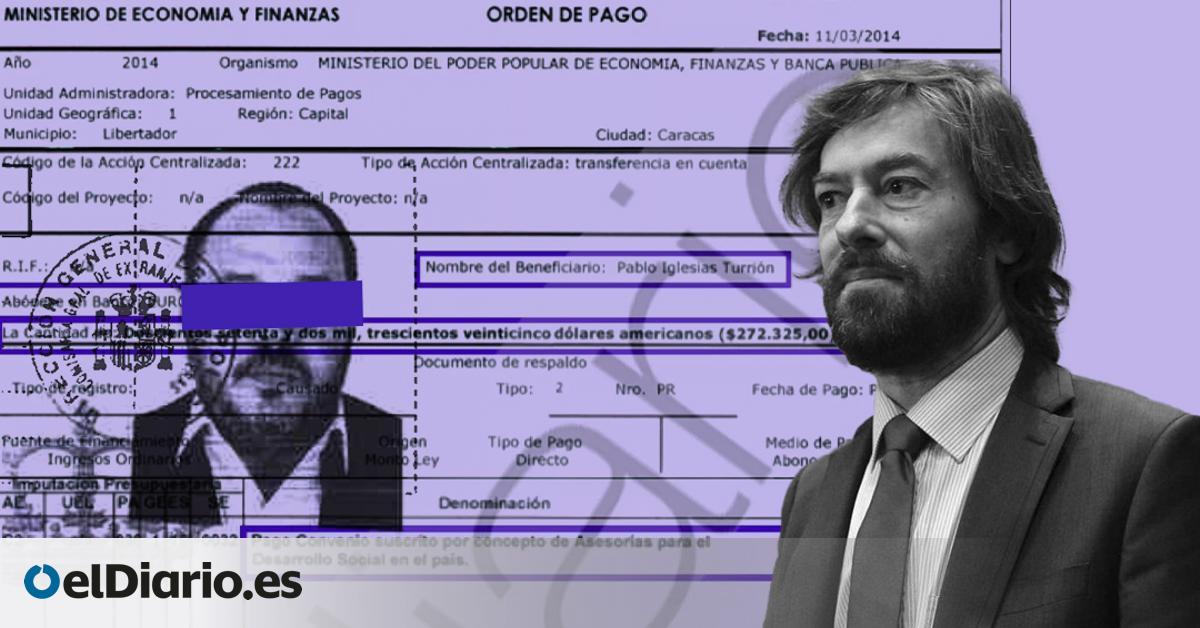
The investigation into the dirty war against Podemos, which was carried out by the Ministry of the Interior during the last Popular Party government, is moving forward in the National Court with the summons of the person who was then the highest official in the Immigration and Documentation Police. Retired commissioner Emilio Baos has been summoned as a witness by Judge Santiago Pedraz to explain on July 11 the granting of residency to a Venezuelan citizen who has admitted being behind the hoax that attributed to Pablo Iglesias the ownership of a bank account in a bank in the Grenadines, in the Caribbean.
Last February, Pedraz admitted a complaint filed by Podemos against the former Secretary of State for Security, Francisco Martínez, the former Deputy Director of Operations (DAO) of the Police, Eugenio Pino, and other senior officials of the Force for alleged prospective investigations outside of judicial control on the people who then made up the opposition party.
Among the maneuvers that the judge agreed to investigate is the publication in Okdiario on May 6, 2016 of a story with the following headline: “The Maduro government paid $272,000 to Pablo Iglesias in the tax haven of the Grenadines in 2014.” That same day, the entity in question, Europacific Bank Limited, issued a statement in which it assured that “it has never maintained an account for this person nor received a bank transfer from any of the financial institutions or sources mentioned in the article.”
Podemos has added to the case a notarized document in which the Venezuelan citizen Carlos Arias claims that the documents published by OkDiario came from the “Cuban G2 Service” and the “Bolivarian Government of Venezuela” and that they are “authentic and true.” “I was the one who provided them to the Spanish Police, who then provided them to OkDiario,” was written (with a typo) in his statement before a notary.
The document was provided by Eduardo Inda’s defence, in the civil suit that Iglesias filed for interference in the right to honour against the director of Okdiario. The court ruled that the newspaper had carried out the necessary checks and dismissed the claims of the former Podemos leader on two occasions. Three other court rulings, these in criminal proceedings, have ruled out that Iglesias had any account at Euro Pacific Bank.
Sabotage a left-wing government
The publication of the aforementioned hoax occurred five weeks before the general elections of June 26, 2016. The Ministry of the Interior headed by Jorge Fernández Díaz had redirected the strategy of apocryphal reports and fake news that it had inaugurated against the independence process in Catalonia towards Podemos. Podemos had become a priority now that it could reach the Government if it made a pact with the PSOE.
The negotiations between the two left-wing parties after the elections in December 2015 had also been the subject of an attempt at sabotage by the Ministry of the Interior with the collaboration of some media outlets. When contacts between PSOE and Podemos were beginning, Eduardo Inda’s website and El Confidencial published the content of a dossier entitled PISA (Pablo Iglesias Sociedad Anónima). The PISA report is another of Judge Pedraz’s lines of investigation in the National Court, a parapolice document that never passed the courts’ filter, although its preparation was mainly aimed at being published in the press.
In this context, any information coming from Venezuela, whether true or false, took on special importance for the group of police commanders that Mariano Rajoy’s government had ordered to thwart any possibility of an agreement that would mean a change in the Moncloa Palace. One of these commanders admits in a recording that he has travelled to New York to get information that would prevent Podemos from coming to power “with a mandate” from Rajoy himself. The alleged financing of the purple party in its beginnings with money from the Chavista regime was a mantra that multiplied in the headlines and at the same time a thesis that foundered when it was contrasted.
A screenshot from YouTube
The day after the false publication, elDiario.es showed that the document of the alleged transfer to the false Iglesias account was a screenshot of another document that had been shown on YouTube a few hours earlier by a Venezuelan journalist named Patricia Poleo, a strong critic of the Government of Nicolás Maduro, through a channel that broadcasts from Miami. Poleo claimed that the document she showed on her channel, and which was later copied by Okdiario, had been verified by “the Spanish secret services.”
The notarial document signed by Carlos Alberto Arias is dated May 30, 2016, three weeks after the information was published. In it, the Venezuelan informant also states: “Since February I have been collaborating as an informant for the Spanish Police, providing them with all kinds of documents on the money that the Bolivarian Government of Venezuela has contributed to both the Center for Political and Social Studies (CEPS) and Podemos and its leaders, among others, Pablo Iglesias Turrión, in the latter case, among others, in an account at Euro Pacific Bank in the Grenadines Islands.”
When the false information was published, the number two The Interior Ministry had already signed Carlos Alberto Arias’ residence permit “for exceptional reasons.” In a document with his name and signature, dated April 11, 2016, Francisco Martínez “sees reasons for collaboration with the police authorities” in granting the informant a one-year residence permit.
On the same day, the General Commissioner for Immigration Emilio Baos signed the authorization. On July 11, he will have to explain before Judge Pedraz, at the request of the Podemos representatives, whether he followed instructions, knew about the actions of Carlos Alberto Arias or carried out any verification.
“Venezuelans want it to be in the press”
Francisco Martínez, first Fernández Díaz’s chief of staff and then Secretary of State for Security, is the main suspect in the case being investigated by Pedraz for the manoeuvres against Podemos. By admitting the complaint, the judge left out Fernández Díaz and the then director general of the Police, Ignacio Cosidó. For now, the judge is directing his action against Martínez and a group of police commanders, with Eugenio Pino, the operational head of the Corps, at the head. Precisely, a WhatsApp conversation between Pino and Martínez reveals the involvement of the Ministry of the Interior at the highest level in the false information of Okdiario.
“According to our sources, if it is to be given to the press, in the interest of the Venezuelan opposition, it should be El Mundo or El País, through a television media platform. They demand it in order to continue collaborating,” Pino tells the number two at the Interior Ministry, according to the messages extracted from the phone that was seized from Francisco Martínez in March 2020 in the context of the investigation into the Kitchen case, the paramilitary spying on Luis Bárcenas for which the entire leadership of Rajoy’s Ministry of the Interior was prosecuted. In the end, it was Okdiario who published Iglesias’ false account.
Source: www.eldiario.es

